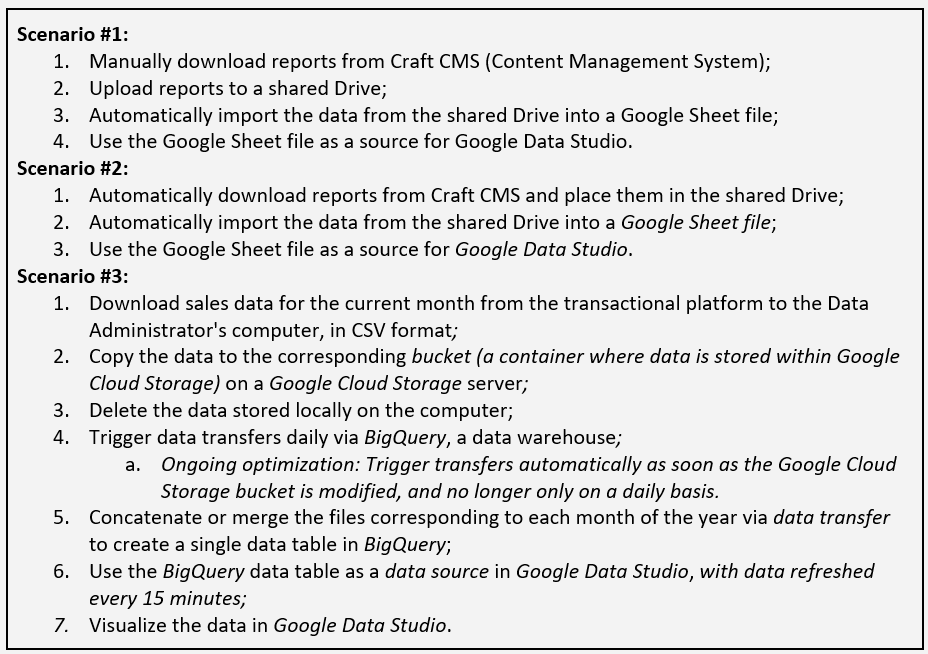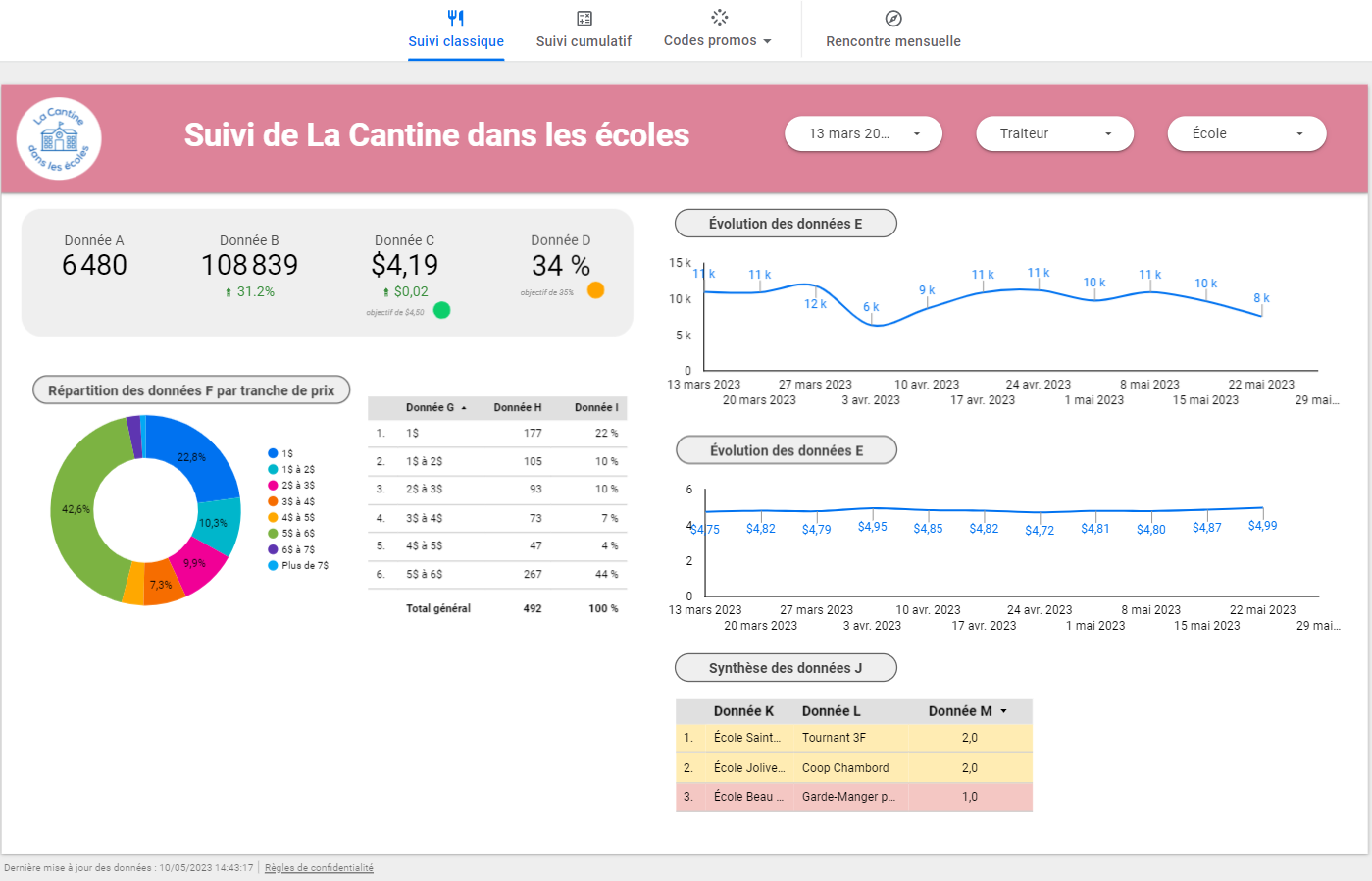note Note générale
Data Storage, Processing and Visualization: La Cantine pour tous' Approach to Informed Data Governance
La Cantine pour tous is a non-profit organization dedicated to food security, offering a wide range of projects to facilitate access to healthy, affordable meals. In the 2022-2023 school year, the program provided meals to 10,872 diners in 40 schools across 6 regions of Quebec. In total, that's four times more meals delivered by La Cantine pour tous this year than in 2021!
Florian Maysonnave, Digital Project Manager at La Cantine pour tous, shares insights into developing a more secure data storage and visualization strategy, tailored to a growing volume of data.
This case study details the considerations, tools and processes that led to improved data governance for La Cantine pour tous.

Addressing data governance considerations at La Cantine pour tous
The transition to a sustainable data storage solution was a priority for La Cantine pour tous, given the rapid increase in the number of meals distributed as well as associated data. Florian wanted to optimize the organization's practices, in particular with regard to data storage and visualization.
Factors considered during the search for data storage and visualization tools
Florian had previously taken an online training course on cybersecurity, and had started thinking about the data storage process. The following are the main considerations raised during the targeted support sessions:
● Security - How to store and share data securely and confidentially on a platform?
● Identity and access management - What are the appropriate procedures for configuring access to datasets according to users and the nature of the data? Who can or cannot download, upload, modify or store data within the platform?
● Data analysis and visualization - What are the technical strengths and limitations of the Google Data Studio platform, a tool that enables data to be transformed into informative dashboards and reports?
● Technological alternatives - Are there other technical solutions with equivalent relevant functionalities?
Exploring different tools and processes for data storage and visualization
Decisions about data storage and access are critical: they determine the availability of data for future use, protect against unauthorized access and mitigate risks.
The Google suite was already being used by the organization, with tools including a shared Drive, Google Sheet, Google Cloud Storage and Google Data Studio. The solutions to be implemented at La Cantine pour tous were to address the above-mentioned issues by leveraging the tools available in the Google suite.
Data storage
Florian explains how he approached his search for a data storage solution to support the activities of La Cantine pour tous. He identified three potential scenarios:
"I devised three ways of improving our data storage that combined various tools. I then tested my hypotheses to determine the best solution," Florian explains.
Scenario #1: This scenario involved a lot of manual work. Users had to log on to the transactional website where customers place their orders, and download reports in CSV format containing the order number, the amount paid, and the delivery date. These were then moved to a shared Drive reserved for data. Credentials to the shared Drive were only available to those authorized to import the data into the folder.
Scripts coded in JavaScript were inserted into a Google Sheet document and used to launch actions to avoid performing certain tasks manually. The script would merge (also known as concatenate) data contained in source files if these were of a similar nature. This concatenated file then served as a source for Google Data Studio.
The challenge posed by Scenario #1 resided in the loading time and the need for manual intervention, which made the process long and tedious.
Scenario #2: In scenario #2, the manual tasks of Scenario #1 are automated. On the other hand, the time required to load data within Google Data Studio when a variable is modified remains excessively long. This led to significant delays in terms of dashboard display, particularly when chart filters were changed.
Scenario #3: Reports continue to be downloaded manually from the transactional platform and are imported directly into Google Cloud Storage. An automatic data transfer is then performed from Google Cloud Storage to Google BigQuery. BigQuery serves as a data source for Google Data Studio, enabling efficient management of large volumes of data.
With databases ranging from 300 megabytes to up to 2 gigabytes, this was an important consideration for La Cantine pour tous! This measure helped solve all issues connected to slowness in Google Data Studio, and all for the modest sum of 20 cents per month.
Florian is pleased with the storage mechanism devised through Scenario #3. A potential future enhancement would be to automate the downloading of reports from the transactional website.
The figure below summarizes the three paths explored by Florian in order to analyze, store and visualize the organization's data.

Data processing and visualization
Google Data Studio was selected for data processing and visualization, enabling the tracking of orders placed and financial contributions received. The dashboard implemented is shown in the figure below.
"It's so much faster! I don't waste so much time processing data on a daily basis. With optimized processing and storage, I can focus on the data that is really relevant to the organization in the long term," notes the Digital Project Manager at La Cantine pour tous.

Data access and modification management policy
The data access and modification management policy ensure that only authorized individuals, according to their roles, can access and modify data. This is made possible by the functionalities integrated into the tools outlined above. This approach guarantees the controlled use of data, reducing the risk of leakage or misuse.
Florian Maysonnave points out that only those users authorized to import data into the system have access to it - a total of three individuals: an administrator and two other employees. The targeted support sessions considerably limited access authorizations to data on the shared Drive through the implementation of Google Cloud Storage. This solution allows employees to import files, but limits their ability to edit them.
Better data governance also requires team involvement
Although Florian was responsible for the organization's data governance strategy, he knew that his team needed to be fully engaged to ensure effective and secure data management. Florian's colleagues therefore also needed to be made aware of good data governance practices and trained in the use of the newly deployed tools and processes.
Lessons learned by La Cantine pour tous in optimizing data governance
- Setting up a dashboard is within everyone's reach
● Adopting a data visualization solution for decision support and performance analysis is accessible: it is affordable, does not require a high level of expertise, and is feasible for organizations of all sizes.
2. Cybersecurity relies on both an informed choice of tools and organizational culture
● The implementation of security protocols is facilitated by tools native to Google (or Microsoft) solutions. Data security is ensured by individualized access control and a tiered hierarchy of possible actions (read, write, delete...).
● Technological platforms have their limits, however, which is why it's important to create and nurture a culture of security within the organization.
3. Before embarking on a major redevelopment project, it is essential to assess the data system and define the requirements
● Performing a comprehensive, in-depth analysis to identify the various data fields retrieved and the available file formats provides the basis for assessing the risks associated with personal data, and proposing a solution that takes into account the limitations of our tools.
4. Strong team commitment boosts positive outcomes
● Team members need to see how the organization's data governance is relevant to their position. The common good must be perceived by the team at large when new tools and processes are implemented, so that it does not become a burden for everyone. Cybersecurity training, sharing best practices and investing in preventative measures all helped rally the team around the common goal of improving data governance.
Impact of the new data governance model
The tools and processes implemented enable La Cantine pour tous to better monitor overall program performance. The team now has access to a global view of each school's budget situation on a more regular basis, which improves the tracking of operations and overall program performance.
The solutions deployed are capable of managing large amounts of data more securely, which was a key priority in this data governance overhaul project.
The team has noticed significant time savings thanks to faster visualization, which supports the operations and growth of La Cantine pour tous. The implementation of technical solutions has enabled the team to take greater ownership of the data. Optimizing access to essential information for the organization's operations allows for better decision-making and improved management of programs. The steps taken by La Cantine pour tous to improve its data governance are bearing fruit: the time and effort invested contribute to the organization's growth and well-being.
According to the Digital Project Manager at La Cantine pour tous, "The coaching sessions were an important first step in launching this major project within La Cantine pour tous, connected with the implementation of Law 25 and our internal growth. Working with Open North allowed us to explore several avenues and increase the maturity of our data governance in a short amount of time."
It's not too late to rethink your data governance! Check out our other case studies for helpful tips and best practices.
Are you facing similar challenges in your own organization? Take a look at the solutions explored by La Cantine pour tous and discover tools and processes for secure data governance, tailored to large volumes of data.
You can read more about La Cantine pour tous' approach and the targeted support provided by Open North in this blog post: La Cantine pour tous' recipe for optimized data governance: a case study.
About the Montréal in Common Data Governance Workstream
As the lead of the Data Governance Workstream within Montréal in Common, Open North proposes a data governance journey to the innovation community in order to progressively operationalize the principles of the City of Montreal's Digital Data Charter. The program explicitly focuses on collecting, sharing and leveraging data to inform collective and individual decision-making.
Montréal in Common brings together an innovation community led by the City of Montréal, whose partners are experimenting with solutions in food access, mobility and municipal regulations in a desire to rethink the metropolis. Thirteen projects are being implemented as part of Montréal in Common thanks to the $50 million prize awarded to the city by the Government of Canada as part of the Smart Cities Challenge.
Did you find this article interesting? Would you like to know more about data governance? Not sure where to start? Find other resources, free training courses and more on our website: https://opennorth.ca/
Authors: La Cantine pour tous, Open North
Research and editorial contributions: Marie Plamondon, Alexandra Gellé, Jérémy Diaz, and Florian Maysonnave (La Cantine pour tous)
We extend our thanks to all our partners and clients, whose work continuously expands and evolves our understanding of data governance and its best practices.
Carnet(s) relié(s)
 file_copy
25 notes
file_copy
25 notes
Le Chantier de la gouvernance des données de Montréal en commun
file_copy 25 notesAuteur·trice(s) de note
Contacter l’auteur·triceCommunauté liée
Montréal en commun
Plus d’informationsPublication
24 janvier 2024
Modification
12 février 2024 15:47
Visibilité
public
